人教新课标高一必修1 Unit 2 English around the world单元复习课件(69张)
文档属性
| 名称 | 人教新课标高一必修1 Unit 2 English around the world单元复习课件(69张) |

|
|
| 格式 | zip | ||
| 文件大小 | 1008.1KB | ||
| 资源类型 | 教案 | ||
| 版本资源 | 人教版(新课程标准) | ||
| 科目 | 英语 | ||
| 更新时间 | 2017-01-18 00:00:00 | ||
图片预览


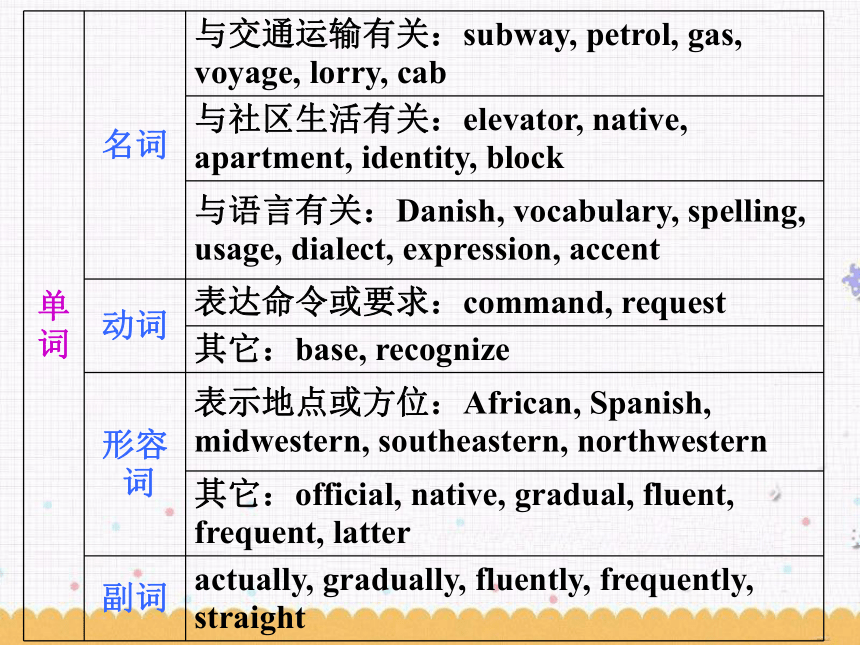
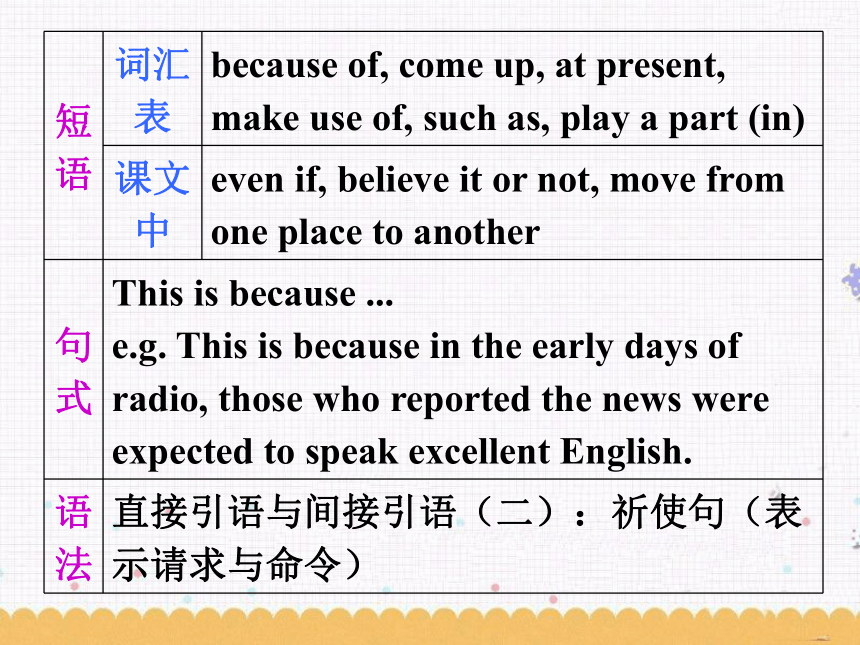
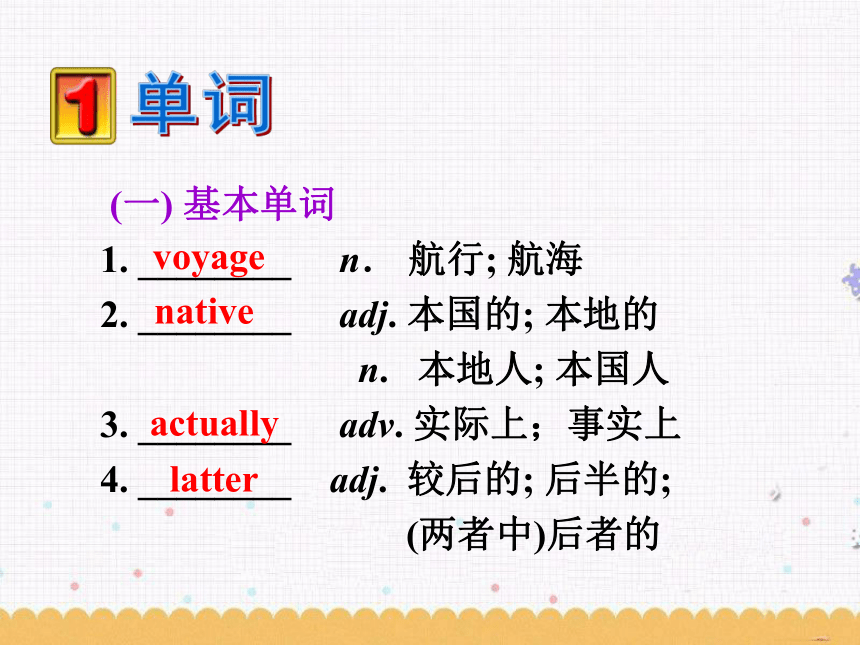
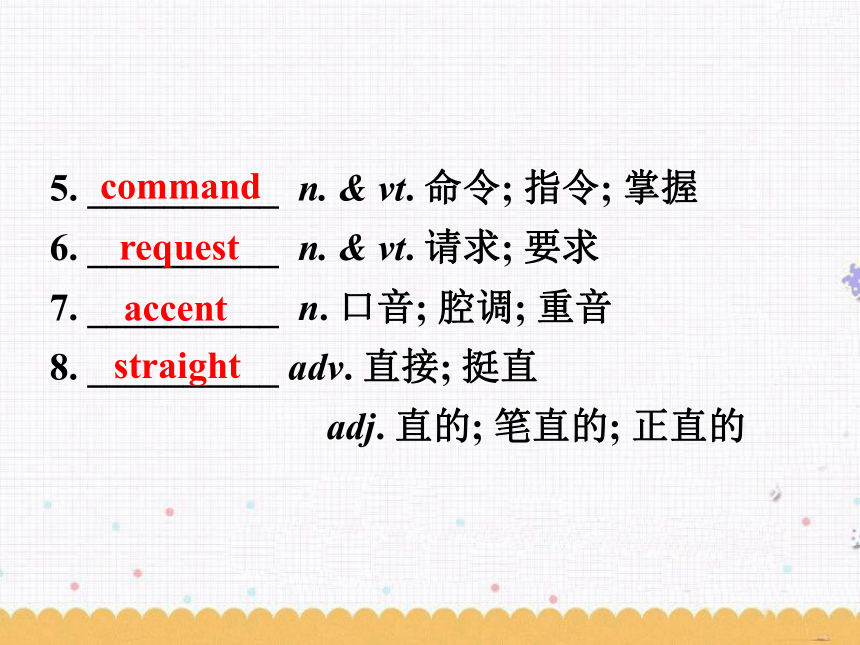
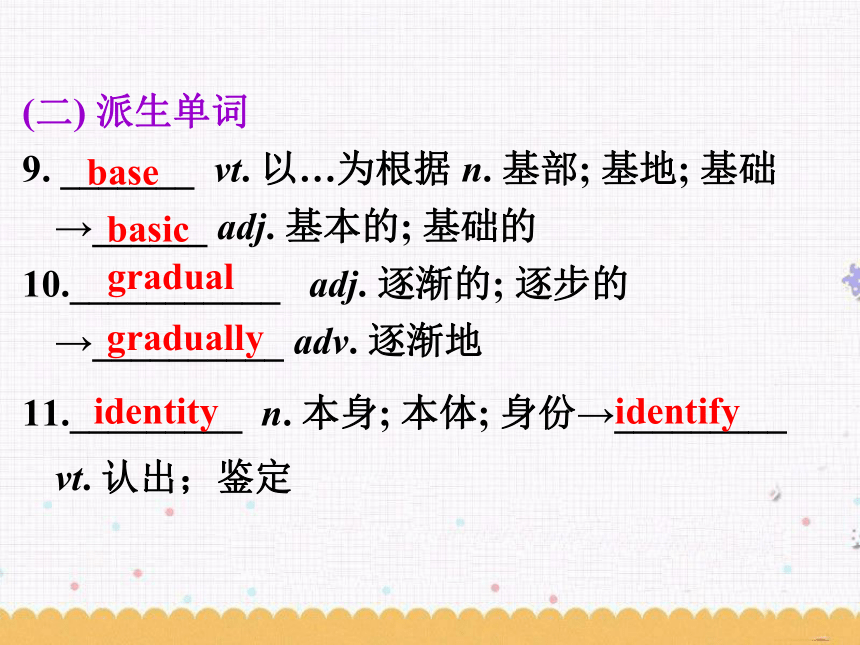
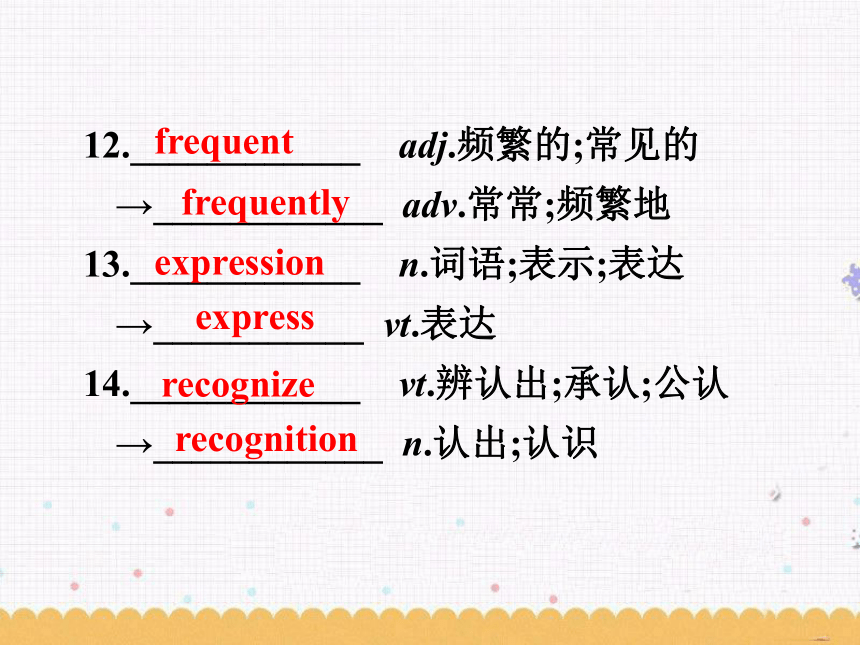
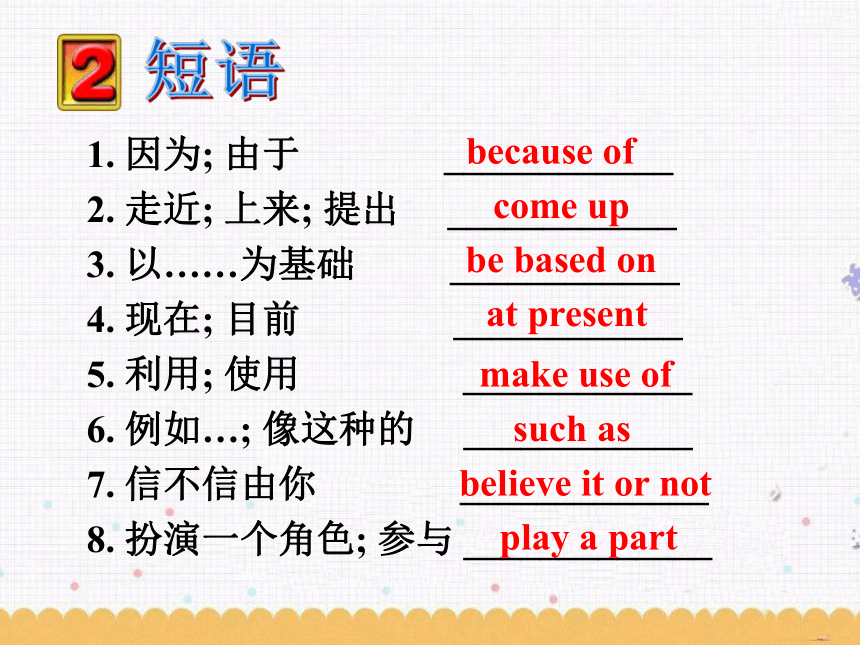

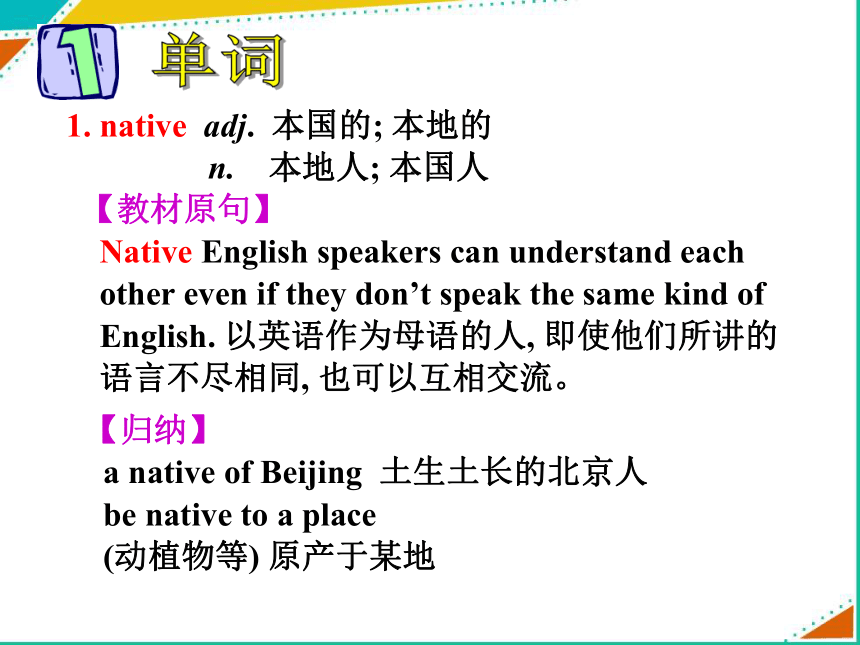
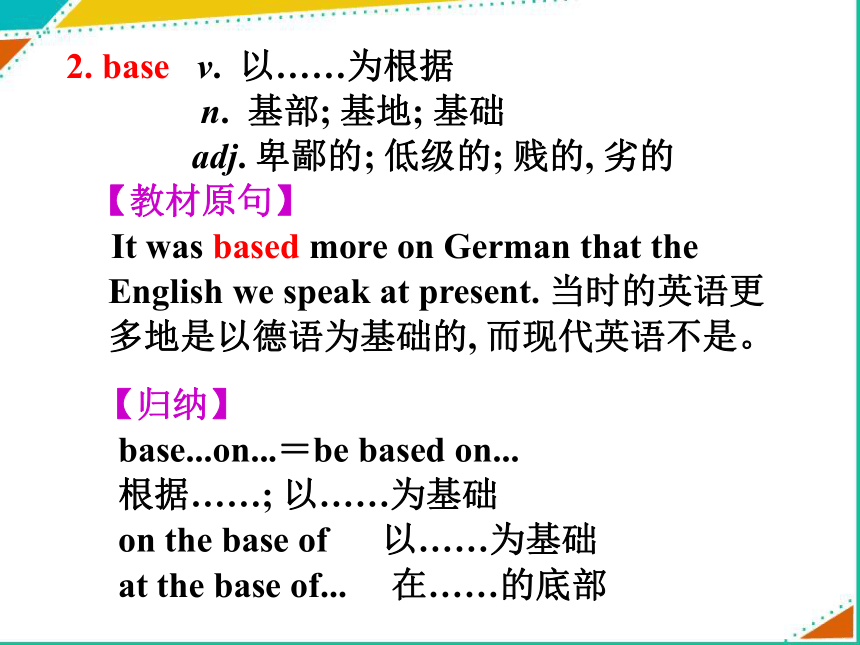
文档简介
课件69张PPT。Unit 2
English around the world知识清单 (一) 基本单词
1. ________ n. 航行; 航海
2. ________ adj. 本国的; 本地的
n. 本地人; 本国人
3. ________ adv. 实际上;事实上
4. ________ adj. 较后的; 后半的;
(两者中)后者的voyagenativeactuallylatter单词5. __________ n. & vt. 命令; 指令; 掌握
6. __________ n. & vt. 请求; 要求
7. __________ n. 口音; 腔调; 重音
8. __________ adv. 直接; 挺直
adj. 直的; 笔直的; 正直的commandrequestaccentstraight(二) 派生单词
9. _______ vt. 以…为根据 n. 基部; 基地; 基础→______ adj. 基本的; 基础的
10.___________ adj. 逐渐的; 逐步的→__________ adv. 逐渐地
11._________ n. 本身; 本体; 身份→_________ vt. 认出;鉴定basebasicgradualgraduallyidentityidentify12.____________ adj.频繁的;常见的→____________ adv.常常;频繁地
13.____________ n.词语;表示;表达→___________ vt.表达
14.____________ vt.辨认出;承认;公认→____________ n.认出;认识frequentfrequentlyexpressionexpressrecognizerecognition1. 因为; 由于 ____________
2. 走近; 上来; 提出 ____________
3. 以……为基础 ____________
4. 现在; 目前 ____________
5. 利用; 使用 ____________
6. 例如…; 像这种的 ____________
7. 信不信由你 _____________
8. 扮演一个角色; 参与 _____________because ofcome upbe based onat presentmake use ofsuch asbelieve it or notplay a part短语核心要点1. native adj. 本国的; 本地的
n. 本地人; 本国人
【教材原句】
Native English speakers can understand each other even if they don’t speak the same kind of English. 以英语作为母语的人, 即使他们所讲的语言不尽相同, 也可以互相交流。【归纳】
a native of Beijing 土生土长的北京人
be native to a place
(动植物等) 原产于某地单词2. base v. 以……为根据
n. 基部; 基地; 基础
adj. 卑鄙的; 低级的; 贱的, 劣的
【教材原句】
It was based more on German that the English we speak at present. 当时的英语更多地是以德语为基础的, 而现代英语不是。【归纳】
base...on...=be based on...
根据……; 以……为基础
on the base of 以……为基础
at the base of... 在……的底部【提示】
base...on...短语中, base为及物动词,
主动语态中, base后应有宾语, 否则base应用被动形式,即be based on结构。【运用】汉译英。
这部影片是根据辛克莱·刘易斯的小说改编的。
The film is based on a novel by Sinclair Lewis.3. command n. [C]命令; 指令; [U]掌握
vt. 命令; 指挥; 支配;博得;赢得【归纳】
command sb. to do sth. 命令某人做某事
command that sb. (should) do...
命令某人
have a good command of 掌握, 精通
at one’s command
听某人支配,奉某人之命
under one’s command
=under the command of 由……指挥command动词表示“命令, 要求”时, 一般不用作进行时; 其后可接名词或代词作宾语;
接带动词不定式的复合结构和that从句时, 从句中的谓语动词应用虚拟, 即“(should+)动词原形”。【运用】汉译英。
如果你熟练掌握英语, 你就有可能得到 这份工作。
If you have a good command of English, it is possible for you to get the job.4. request n. & vt. 请求; 要求【归纳】
make a request for 请求; 要求
at one’s request=at the request of sb.
应某人的要求
request sb.to do sth.
请求/要求某人做某事
request that...(should) do...
请求……做某事
It is requested that... (should) do...
要求……【运用】根据所给汉语完成句子。
1. I came ______________ (应你要求).
2. You ___________________ (请不要) smoke.at your requestare requested not to5. recognize vt. 辨认出; 承认
【教材原句】
Although many Americans move a lot,
they still recognize and understand each
other’s dialects. 虽然很多美国人经常搬迁,
但是他们仍然能够辨别、理解彼此的方言。【归纳】
recognize sb. 认出某人
be recognized to be/as...
被认作……/被认为是……
It is recognized that... 人们公认……recognize / realize / know
recognize 指原来熟悉, 经过一段时间间隔后重新认出来。
realize 指经过一个过程后“意识到”。
know 指相互十分熟悉和了解。【运用】
用recognize/realize/know的适当形式填空。
At first, he didn’t _______ that he had been __________ by his old friend who he ______ very well in the past.realizerecognizedknew1. because of 因为; 由于
【教材原句】
Later in the next century, people from
England made voyages to conquer other
parts of the world and because of that,
English began to be spoken in many other
countries. 后来, 在17世纪英国人开始航海
征服了世界其它地区。于是, 许多别的国
家开始说英语了。短语【拓展】
due to 由于(作表语/状语)
owing to 由于(作表语/状语)
as a result of 因为; 由于(作状语)
thanks to 多亏; 由于(作表语/状语)
【提示】
because of为介词短语; because为连词【运用】完成下列句子。
1) He came late to school again _______ he got up too late.
2) The girl cried _________ what the teacher said.
3) We have to cancel our trip _________ the bad weather.becausebecause of because of 2. come up 走近; 上来;
(太阳/月亮等)升起; 被提出;
长出; 发生; 开始流行
【教材原句】
I’d like to come up to your apartment.
我很乐意到你的公寓去。【拓展】
come up with 想出(计划/答案); 产生
come about 发生
come along 进展; 进步; 进行come on 快点; 加油
come to 总计; 总共; 达到; 说到
come across 偶遇; 碰到
come out 出现; 显露; 出版;
结果是; 公开表态
come over 过来; 突然感到; 顺便来访;
在上空[上方]经过
come down 下降; 潦倒; 流传
come back 回来; 恢复(知觉/记忆等);
回想起; 卷土重来; 重新流行;
反驳......come in 进来; 起作用
come by 从旁边走过; 得到; 经过
come into 进入; 得来; 继承(财产)
come through 经历; 脱险; 安然度过
come with 伴随......发生
come from 来自; 起源于
come around 顺便来访;苏醒;复苏
come true 实现; 成真【提示】
come up “问题, 建议或方案等被提出”时为不及物动词短语, 其主语通常为物, 无被动语态;
come up with 为“提出”, 为及物动词短语, 主语通常为人, 宾语为表示“建议/计划/方案等”的名词。【运用】用come短语的适当形式填空。
1) How did it __________ that he knew where we were?
2) I ___________ an old school friend in Oxford street this morning.
3) A good solution to the problem ________ at the meeting.
4) When did you ____________ the good idea?come aboutcome acrosscome upcome up with3. make use of 利用; 使用
【教材原句】
So by the 1600’s Shakespeare was able
to make use of a wider vocabulary
than ever before. 所以到17世纪, 莎士比
亚所用的词汇量比以前任何时期都大。【拓展】
make full use of make good use of
make the best of make the most of
充分利用
make up 弥补; 和解; 编造; 整理; 化妆make-up 化妆品; 性格
make for 走向; 有助于; 促进
make it 成功; 达到预定目标; 幸存
make a difference 有影响; 起(重要)作用
make up for 补偿; 弥补
make of 理解; 推断; 以......为材料制作
make over (财产)转让; 移交; 改造; 重做
make up of 由......构成; 由......组成
make-believe 假装; 假扮; 幻想make sense 讲得通; 有意义; 言之有理
make out 起草; 说明; 结论; 辨别; 理解
make sure 弄明白; 设法确保
make progress 取得进步
make clear 讲清楚;表明
make off 离开; 逃走
make efforts=make an effort=
make all efforts=spare no effort 作出努力use的短语及句型
【归纳】
make use of 利用
(be) out of / in use
不再使用,废弃不用/在使用中
be of use (to sb.) 有用处,起作用
come into use 开始使用
It’s / There’s no use doing sth. 没有用【运用】翻译下列句子。
这个火车站已经停止使用了。
This railway station is out of use.
对于他来说,这个已经没有什么用处了。
This was not of much use to him.
雨伞是什么时候开始使用的?
When did umbrellas come into use?
问我是没有用的。我不比你知道的更多。
It’s no use asking me. I don’t know any more than you do. It was based more on German than the English we speak at present.
当时的英语更多地是以德语为基础的,而现代英语不是。
more...than... 与其……倒不如……
强调more后面的内容, 表同一个人或事物的两种特征对比, more和than后接形容词/副词的原级, 名词或介词短语等两个并列成分。句式e.g. She was more sad than angry when her son lied.
当她的儿子撒谎时,与其说她生气倒不如说她伤心。more than+数词 超过, 多于
more than+名词 表不仅是, 不只是
e.g. He is more than a scientist; he is also a poet. 他不仅仅是位科学家,还是一位诗人。 【运用】写出下列句子中more than的含义。
1) There are more than 1,000 students in our school this year. _______
2) He felt more than surprised to see his father came. _______
3) Mr.Zhang is more than a teacher;he is also my friend. _______超过非常不仅仅more than+形容/副词 非常, 很
no more than=only 只有, 仅仅
not more than “至多, 不超过”
other than 除了……
rather than... 而不是……no?less?than 不亚于, 竟达……之多??
e.g. The?audience?was?no?less?than?five?
thousand.
听众有五千人之多。??
not?less?than 不比……差, 至少??
e.g. I’ll?stay?here?not?less?than?three?days.
我将待在这里至少三天。直接引语与间接引语(二)
观察下列几组句子的转化规律,加以总结。
1. A. He said to me, “Please open the window.”
→ He asked me to open the window.
B. “Be careful with the dog,” she said to me.
→ She told me to be careful with the dog. 语法2. A. My aunt said to me, “Don’t read in the sun.”
→ My aunt told me not to read in the sun.
B. Tom’s father said to him, “Don’t drive too fast.”
→ Tom’s father told him not to drive too fast.3. A. “Come next week,” Bob suggested.
→ Bob suggested my coming / that I (should) come the following week.
B. “Let me give you a lift home,” David said.
→ David offered to give me a lift home.
4. A. “What a lovely house it is!” Peter said.
→ Peter said what a lovely house it was.
B. “How well you look!” Jane said.
→ Jane said how well I looked.【自我归纳】
★转述祈使句时,采用“动词+宾语+不定式”结构。引述动词有ask, tell等。如第1组。
★转述祈使句时,如果祈使句为否定式,则在不定式前加not。如第2组。
★“建议,提议”的祈使句时,可采用“suggest+ ____________” 或 “suggest+ ________”,也可采用“offer +不定式” 结构。如第3组。
★引述感叹句时,常以_____或_____为被引述分句的引导词。如第4组。动词-ing形式that从句whathow【即学即练】 将直接引语变为间接引语。
1. “Please turn on the computer.” My mother said to me.
______________________________________
2. “Don’t make so much noise, boys.” The teacher said.
_____________________________________
___________
3. “What a lovely day it is!” he said.
_______________________________My mother asked me to turn on the computer.The teacher told the boys not to make so
much noise.He said what a lovely day it was.4. He said, “Let’s go to the cinema.”
________________________________
5. “Leave the room quietly,” Leo said.
_________________________________He suggested going to the cinema.Leo told me to leave the room quietly.海报是一种常见的招贴形式的应用文。
【写作任务】
1. 明确海报的主题
明确你要写的海报主题是活动宣传、招聘
广告还是人物介绍。
2. 确定海报的格式
标题:居于海报正上方,用简洁、引人注目的语言概括要宣传的主题。作文如何写英文海报正文:根据海报的内容灵活安排。
① 海报的最前面要采用一些鼓动性较强的语句来吸引注意,常采用排比、反问、设问等修辞手法。
② 列出海报的具体内容:
★ 写活动宣传时,先介绍要宣传的活动,再写活动的时间、地点、目的、活动安排以及主办单位等。
★ 写招聘广告时,先介绍职位,然后写对求职者的要求等。★ 写人物介绍时,先把人物名字放在显要位置,依次介绍该出生时间、地点、生平简介及特殊贡献等。
结尾:海报发布者及时间常写在海报左下
角(也可省去)。【常用表达】
活动宣传Title?????
Do you want to ...?
Do you have difficulty in ...?
Why not ...?
If you ..., you will ...
Why should you ...??????
Date: ...??????? Place: ...? ??????Aim: To ...
For more details, please contact ...招聘广告Title?????
Would you like to be a(n) ...?
If your answer is “Yes”, we have a job for you as a(n) ...?????
Requirements:?be good at ...;
have ... years of work experience;
be able to speak ... and use ...;
be kind / easygoing / friendly / patient / strict / careful / ...?????
Please call ... if you want to ...人物介绍Title / Name?????
Date of birth: ...????? Place of birth: ...?????
Career: ...????? ... was born into ...;
... have / has / had a great gift for ...;
... is / was a remarkable achievement for ...; Although / Though ... lacks his / her family’s support, he / she continued ...【写作任务】
最近,你校成立了一个英语学习俱乐部(English Learning Club)。现邀请同学们加入,请你根据所给提示要点设计一则英语海报,发布在你校英语论坛上。
内容包括:1. 标题; 2. 加入俱乐部的好处; 3. 结尾。【参考范文】
Why should you join the English Learning Club?
★to meet new friends ★to debate in English
★to read English novels ★to learn English songs
★ to watch English movies
★ to talk in English with English native
speakers ??????
Practice makes perfect. Please join the English Learning Club to learn English with other English lovers.高考链接1. (2014·浙江改编)We most prefer to say yes
to the ________ (request) of someone we
know and like.
答案: requests
句意: 我们大都更愿意答应我们所了解和喜欢人的请求。由语境可知, 只能是对别人的请求(requests)说yes, 即: 答应对方的请求。2. (2014·北京改编) ________ though the
forest park is far away, a lot of tourists
visit it every year.
答案:Even 本题考查状语从句引导词的选择。
句意:尽管森林公园离得很远, 但每年都有很多游客会去游览。even though相当于even if, 意为“尽管, 虽然”, 引导让步状语从句。3. (2014·北京改编)The film star wears sunglasses. Therefore, he can go shopping without ________ (recognize).
答案:being recognized 本题考查非谓语动词。
句意:那位影星戴着墨镜, 因此他可以在没人认出的情况下购物了。without为介词, 后面接动词ing形式; the film star与recognize之间存在被动关系, 故用动词ing的被动式, 即“being done”结构。4. (2010·浙江改编)
—According to my grandma, it is a good idea to eat chicken soup when you have a cold.
—Believe _____ or not, scientists agree with her.
答案:it
句意:—在我奶奶看来, 在你感冒时喝鸡汤是个好主意。
—信不信由你, 科学家们与她的观点一致。believe it or not“信不信由你”。5. (2012·江苏改编) ________ (base) an important decision more on emotion than on reason, you will regret it sooner or later.
答案:Basing 考查非谓语动词。you与base之间是逻辑上的主谓关系,故用现在分词作状语, 表主动。
句意:如果凭情感而不是理智作出这个决
定,你迟早会后悔的。6. (2011·浙江改编)The school isn’t the one
I really wanted to go to, but I suppose
I’ll just have to make ________ best of
it.
答案:the
句意:这个学校并不是我真正想去的,
但既然来了, 我还是想充分利用它。
make the best of 充分利用, 妥善处理。巩固练习I. 根据提示, 写出所缺单词的正确形式。
1. Police are trying to discover the i______ of the baby found by the side of a road.
2. The school was only a few b_____ from where she lived.
3. Of football and basketball, I prefer the l______.identityblocks?latter?4. My wife’s a(n) _______ (本地的) New Yorker, but I’m from Atlanta.
5. Spanish is the country’s _______ (官方的) language.
6. The ______ (航行) from England to India used to take six months.
7. I hadn’t seen her for 20 years, but I r________ her immediately.
8. A s_______ line is the shortest distance between two points.nativeofficial?voyagerecognizedstraightII. 选用合适的短语并用其正确形式填空。
1. All flights have been cancelled _________ bad weather.
2. How many people are living in this house _________?
3. I’ll let you know if anything ________.
4. You should __________ every chance to improve your English.
5. The story in the film __________ real life.because of, come up, at present,
make use of, base ... onbecause ofat presentcomes upmake use ofis based onIII. 将直接引语变为间接引语。
1. “Please buy a cake for me on your way home, Mum,” said Tom.
___________________________________
___________________________________
2. His father said to Jim, “Don’t drive too fast.”
___________________________________Tom asked his mum to buy a cake for
him on her way home.Jim’s father told him not to drive too fast.3. Mary said, “Let’s go to the art exhibition this afternoon.” ______________________________________________________________________
4. Jane said, “How excited I am!”
__________________________________Jane said that she was very excited. Mary suggested that we (should) go to the art exhibition that afternoon.Ⅳ.阅读材料, 在空白处填入适当的内容。
The English language originated in Britain. The earliest 1. _______ (know) inhabitant of Britain were the Celts. Few Celtish words survive today, 2. _____ place names like London and Dover have Celtish origins. Around 43 BC, the Romans started to invade Britain, bringing in words like wine, candle and wall. Then, as the Roman Empire began to fall, the first Germanic tribes arrived and started to settle in Britain around 449 AD. These were the Angles, the Saxons and the Jutes with their Anglo-Saxon dialects. knownbutAbout 3. _______ third of basic everyday English words like earth, house, food, sing, night and sleep are of Anglo-Saxon origin. The word England comes from the word Anglia, the land of the Angles. The first Danish invasion of Britain was in the year 789. They brought with them words like anger, cake, die, egg, skirt and smile. When the Normans 4. _________
(conquer) Britain in 1066, the 5. _______ (use) of thousands of French words like crown, castle, army, beauty and color gradually became frequent. a/ oneconquered?usageThis mixture of tongues became the modern English language 6. __________ was spread around the world during the days of the British Empire. But the English that 7. ___________ (bring) to lands like North America, Australia, New Zealand, India and Africa did not stay the same. These lands and their peoples’ languages left their marks on the English language too, enriching its 8. __________ with words like jungle, shampoo and pajamas from India; and banana, banjo, trek and jukebox from Africa. The English language is like a sponge 9. _________ (absorb) new words and expressions as rapidly 10. _____ it spreads.which / thatwas brought?vocabularyabsorbingas
English around the world知识清单 (一) 基本单词
1. ________ n. 航行; 航海
2. ________ adj. 本国的; 本地的
n. 本地人; 本国人
3. ________ adv. 实际上;事实上
4. ________ adj. 较后的; 后半的;
(两者中)后者的voyagenativeactuallylatter单词5. __________ n. & vt. 命令; 指令; 掌握
6. __________ n. & vt. 请求; 要求
7. __________ n. 口音; 腔调; 重音
8. __________ adv. 直接; 挺直
adj. 直的; 笔直的; 正直的commandrequestaccentstraight(二) 派生单词
9. _______ vt. 以…为根据 n. 基部; 基地; 基础→______ adj. 基本的; 基础的
10.___________ adj. 逐渐的; 逐步的→__________ adv. 逐渐地
11._________ n. 本身; 本体; 身份→_________ vt. 认出;鉴定basebasicgradualgraduallyidentityidentify12.____________ adj.频繁的;常见的→____________ adv.常常;频繁地
13.____________ n.词语;表示;表达→___________ vt.表达
14.____________ vt.辨认出;承认;公认→____________ n.认出;认识frequentfrequentlyexpressionexpressrecognizerecognition1. 因为; 由于 ____________
2. 走近; 上来; 提出 ____________
3. 以……为基础 ____________
4. 现在; 目前 ____________
5. 利用; 使用 ____________
6. 例如…; 像这种的 ____________
7. 信不信由你 _____________
8. 扮演一个角色; 参与 _____________because ofcome upbe based onat presentmake use ofsuch asbelieve it or notplay a part短语核心要点1. native adj. 本国的; 本地的
n. 本地人; 本国人
【教材原句】
Native English speakers can understand each other even if they don’t speak the same kind of English. 以英语作为母语的人, 即使他们所讲的语言不尽相同, 也可以互相交流。【归纳】
a native of Beijing 土生土长的北京人
be native to a place
(动植物等) 原产于某地单词2. base v. 以……为根据
n. 基部; 基地; 基础
adj. 卑鄙的; 低级的; 贱的, 劣的
【教材原句】
It was based more on German that the English we speak at present. 当时的英语更多地是以德语为基础的, 而现代英语不是。【归纳】
base...on...=be based on...
根据……; 以……为基础
on the base of 以……为基础
at the base of... 在……的底部【提示】
base...on...短语中, base为及物动词,
主动语态中, base后应有宾语, 否则base应用被动形式,即be based on结构。【运用】汉译英。
这部影片是根据辛克莱·刘易斯的小说改编的。
The film is based on a novel by Sinclair Lewis.3. command n. [C]命令; 指令; [U]掌握
vt. 命令; 指挥; 支配;博得;赢得【归纳】
command sb. to do sth. 命令某人做某事
command that sb. (should) do...
命令某人
have a good command of 掌握, 精通
at one’s command
听某人支配,奉某人之命
under one’s command
=under the command of 由……指挥command动词表示“命令, 要求”时, 一般不用作进行时; 其后可接名词或代词作宾语;
接带动词不定式的复合结构和that从句时, 从句中的谓语动词应用虚拟, 即“(should+)动词原形”。【运用】汉译英。
如果你熟练掌握英语, 你就有可能得到 这份工作。
If you have a good command of English, it is possible for you to get the job.4. request n. & vt. 请求; 要求【归纳】
make a request for 请求; 要求
at one’s request=at the request of sb.
应某人的要求
request sb.to do sth.
请求/要求某人做某事
request that...(should) do...
请求……做某事
It is requested that... (should) do...
要求……【运用】根据所给汉语完成句子。
1. I came ______________ (应你要求).
2. You ___________________ (请不要) smoke.at your requestare requested not to5. recognize vt. 辨认出; 承认
【教材原句】
Although many Americans move a lot,
they still recognize and understand each
other’s dialects. 虽然很多美国人经常搬迁,
但是他们仍然能够辨别、理解彼此的方言。【归纳】
recognize sb. 认出某人
be recognized to be/as...
被认作……/被认为是……
It is recognized that... 人们公认……recognize / realize / know
recognize 指原来熟悉, 经过一段时间间隔后重新认出来。
realize 指经过一个过程后“意识到”。
know 指相互十分熟悉和了解。【运用】
用recognize/realize/know的适当形式填空。
At first, he didn’t _______ that he had been __________ by his old friend who he ______ very well in the past.realizerecognizedknew1. because of 因为; 由于
【教材原句】
Later in the next century, people from
England made voyages to conquer other
parts of the world and because of that,
English began to be spoken in many other
countries. 后来, 在17世纪英国人开始航海
征服了世界其它地区。于是, 许多别的国
家开始说英语了。短语【拓展】
due to 由于(作表语/状语)
owing to 由于(作表语/状语)
as a result of 因为; 由于(作状语)
thanks to 多亏; 由于(作表语/状语)
【提示】
because of为介词短语; because为连词【运用】完成下列句子。
1) He came late to school again _______ he got up too late.
2) The girl cried _________ what the teacher said.
3) We have to cancel our trip _________ the bad weather.becausebecause of because of 2. come up 走近; 上来;
(太阳/月亮等)升起; 被提出;
长出; 发生; 开始流行
【教材原句】
I’d like to come up to your apartment.
我很乐意到你的公寓去。【拓展】
come up with 想出(计划/答案); 产生
come about 发生
come along 进展; 进步; 进行come on 快点; 加油
come to 总计; 总共; 达到; 说到
come across 偶遇; 碰到
come out 出现; 显露; 出版;
结果是; 公开表态
come over 过来; 突然感到; 顺便来访;
在上空[上方]经过
come down 下降; 潦倒; 流传
come back 回来; 恢复(知觉/记忆等);
回想起; 卷土重来; 重新流行;
反驳......come in 进来; 起作用
come by 从旁边走过; 得到; 经过
come into 进入; 得来; 继承(财产)
come through 经历; 脱险; 安然度过
come with 伴随......发生
come from 来自; 起源于
come around 顺便来访;苏醒;复苏
come true 实现; 成真【提示】
come up “问题, 建议或方案等被提出”时为不及物动词短语, 其主语通常为物, 无被动语态;
come up with 为“提出”, 为及物动词短语, 主语通常为人, 宾语为表示“建议/计划/方案等”的名词。【运用】用come短语的适当形式填空。
1) How did it __________ that he knew where we were?
2) I ___________ an old school friend in Oxford street this morning.
3) A good solution to the problem ________ at the meeting.
4) When did you ____________ the good idea?come aboutcome acrosscome upcome up with3. make use of 利用; 使用
【教材原句】
So by the 1600’s Shakespeare was able
to make use of a wider vocabulary
than ever before. 所以到17世纪, 莎士比
亚所用的词汇量比以前任何时期都大。【拓展】
make full use of make good use of
make the best of make the most of
充分利用
make up 弥补; 和解; 编造; 整理; 化妆make-up 化妆品; 性格
make for 走向; 有助于; 促进
make it 成功; 达到预定目标; 幸存
make a difference 有影响; 起(重要)作用
make up for 补偿; 弥补
make of 理解; 推断; 以......为材料制作
make over (财产)转让; 移交; 改造; 重做
make up of 由......构成; 由......组成
make-believe 假装; 假扮; 幻想make sense 讲得通; 有意义; 言之有理
make out 起草; 说明; 结论; 辨别; 理解
make sure 弄明白; 设法确保
make progress 取得进步
make clear 讲清楚;表明
make off 离开; 逃走
make efforts=make an effort=
make all efforts=spare no effort 作出努力use的短语及句型
【归纳】
make use of 利用
(be) out of / in use
不再使用,废弃不用/在使用中
be of use (to sb.) 有用处,起作用
come into use 开始使用
It’s / There’s no use doing sth. 没有用【运用】翻译下列句子。
这个火车站已经停止使用了。
This railway station is out of use.
对于他来说,这个已经没有什么用处了。
This was not of much use to him.
雨伞是什么时候开始使用的?
When did umbrellas come into use?
问我是没有用的。我不比你知道的更多。
It’s no use asking me. I don’t know any more than you do. It was based more on German than the English we speak at present.
当时的英语更多地是以德语为基础的,而现代英语不是。
more...than... 与其……倒不如……
强调more后面的内容, 表同一个人或事物的两种特征对比, more和than后接形容词/副词的原级, 名词或介词短语等两个并列成分。句式e.g. She was more sad than angry when her son lied.
当她的儿子撒谎时,与其说她生气倒不如说她伤心。more than+数词 超过, 多于
more than+名词 表不仅是, 不只是
e.g. He is more than a scientist; he is also a poet. 他不仅仅是位科学家,还是一位诗人。 【运用】写出下列句子中more than的含义。
1) There are more than 1,000 students in our school this year. _______
2) He felt more than surprised to see his father came. _______
3) Mr.Zhang is more than a teacher;he is also my friend. _______超过非常不仅仅more than+形容/副词 非常, 很
no more than=only 只有, 仅仅
not more than “至多, 不超过”
other than 除了……
rather than... 而不是……no?less?than 不亚于, 竟达……之多??
e.g. The?audience?was?no?less?than?five?
thousand.
听众有五千人之多。??
not?less?than 不比……差, 至少??
e.g. I’ll?stay?here?not?less?than?three?days.
我将待在这里至少三天。直接引语与间接引语(二)
观察下列几组句子的转化规律,加以总结。
1. A. He said to me, “Please open the window.”
→ He asked me to open the window.
B. “Be careful with the dog,” she said to me.
→ She told me to be careful with the dog. 语法2. A. My aunt said to me, “Don’t read in the sun.”
→ My aunt told me not to read in the sun.
B. Tom’s father said to him, “Don’t drive too fast.”
→ Tom’s father told him not to drive too fast.3. A. “Come next week,” Bob suggested.
→ Bob suggested my coming / that I (should) come the following week.
B. “Let me give you a lift home,” David said.
→ David offered to give me a lift home.
4. A. “What a lovely house it is!” Peter said.
→ Peter said what a lovely house it was.
B. “How well you look!” Jane said.
→ Jane said how well I looked.【自我归纳】
★转述祈使句时,采用“动词+宾语+不定式”结构。引述动词有ask, tell等。如第1组。
★转述祈使句时,如果祈使句为否定式,则在不定式前加not。如第2组。
★“建议,提议”的祈使句时,可采用“suggest+ ____________” 或 “suggest+ ________”,也可采用“offer +不定式” 结构。如第3组。
★引述感叹句时,常以_____或_____为被引述分句的引导词。如第4组。动词-ing形式that从句whathow【即学即练】 将直接引语变为间接引语。
1. “Please turn on the computer.” My mother said to me.
______________________________________
2. “Don’t make so much noise, boys.” The teacher said.
_____________________________________
___________
3. “What a lovely day it is!” he said.
_______________________________My mother asked me to turn on the computer.The teacher told the boys not to make so
much noise.He said what a lovely day it was.4. He said, “Let’s go to the cinema.”
________________________________
5. “Leave the room quietly,” Leo said.
_________________________________He suggested going to the cinema.Leo told me to leave the room quietly.海报是一种常见的招贴形式的应用文。
【写作任务】
1. 明确海报的主题
明确你要写的海报主题是活动宣传、招聘
广告还是人物介绍。
2. 确定海报的格式
标题:居于海报正上方,用简洁、引人注目的语言概括要宣传的主题。作文如何写英文海报正文:根据海报的内容灵活安排。
① 海报的最前面要采用一些鼓动性较强的语句来吸引注意,常采用排比、反问、设问等修辞手法。
② 列出海报的具体内容:
★ 写活动宣传时,先介绍要宣传的活动,再写活动的时间、地点、目的、活动安排以及主办单位等。
★ 写招聘广告时,先介绍职位,然后写对求职者的要求等。★ 写人物介绍时,先把人物名字放在显要位置,依次介绍该出生时间、地点、生平简介及特殊贡献等。
结尾:海报发布者及时间常写在海报左下
角(也可省去)。【常用表达】
活动宣传Title?????
Do you want to ...?
Do you have difficulty in ...?
Why not ...?
If you ..., you will ...
Why should you ...??????
Date: ...??????? Place: ...? ??????Aim: To ...
For more details, please contact ...招聘广告Title?????
Would you like to be a(n) ...?
If your answer is “Yes”, we have a job for you as a(n) ...?????
Requirements:?be good at ...;
have ... years of work experience;
be able to speak ... and use ...;
be kind / easygoing / friendly / patient / strict / careful / ...?????
Please call ... if you want to ...人物介绍Title / Name?????
Date of birth: ...????? Place of birth: ...?????
Career: ...????? ... was born into ...;
... have / has / had a great gift for ...;
... is / was a remarkable achievement for ...; Although / Though ... lacks his / her family’s support, he / she continued ...【写作任务】
最近,你校成立了一个英语学习俱乐部(English Learning Club)。现邀请同学们加入,请你根据所给提示要点设计一则英语海报,发布在你校英语论坛上。
内容包括:1. 标题; 2. 加入俱乐部的好处; 3. 结尾。【参考范文】
Why should you join the English Learning Club?
★to meet new friends ★to debate in English
★to read English novels ★to learn English songs
★ to watch English movies
★ to talk in English with English native
speakers ??????
Practice makes perfect. Please join the English Learning Club to learn English with other English lovers.高考链接1. (2014·浙江改编)We most prefer to say yes
to the ________ (request) of someone we
know and like.
答案: requests
句意: 我们大都更愿意答应我们所了解和喜欢人的请求。由语境可知, 只能是对别人的请求(requests)说yes, 即: 答应对方的请求。2. (2014·北京改编) ________ though the
forest park is far away, a lot of tourists
visit it every year.
答案:Even 本题考查状语从句引导词的选择。
句意:尽管森林公园离得很远, 但每年都有很多游客会去游览。even though相当于even if, 意为“尽管, 虽然”, 引导让步状语从句。3. (2014·北京改编)The film star wears sunglasses. Therefore, he can go shopping without ________ (recognize).
答案:being recognized 本题考查非谓语动词。
句意:那位影星戴着墨镜, 因此他可以在没人认出的情况下购物了。without为介词, 后面接动词ing形式; the film star与recognize之间存在被动关系, 故用动词ing的被动式, 即“being done”结构。4. (2010·浙江改编)
—According to my grandma, it is a good idea to eat chicken soup when you have a cold.
—Believe _____ or not, scientists agree with her.
答案:it
句意:—在我奶奶看来, 在你感冒时喝鸡汤是个好主意。
—信不信由你, 科学家们与她的观点一致。believe it or not“信不信由你”。5. (2012·江苏改编) ________ (base) an important decision more on emotion than on reason, you will regret it sooner or later.
答案:Basing 考查非谓语动词。you与base之间是逻辑上的主谓关系,故用现在分词作状语, 表主动。
句意:如果凭情感而不是理智作出这个决
定,你迟早会后悔的。6. (2011·浙江改编)The school isn’t the one
I really wanted to go to, but I suppose
I’ll just have to make ________ best of
it.
答案:the
句意:这个学校并不是我真正想去的,
但既然来了, 我还是想充分利用它。
make the best of 充分利用, 妥善处理。巩固练习I. 根据提示, 写出所缺单词的正确形式。
1. Police are trying to discover the i______ of the baby found by the side of a road.
2. The school was only a few b_____ from where she lived.
3. Of football and basketball, I prefer the l______.identityblocks?latter?4. My wife’s a(n) _______ (本地的) New Yorker, but I’m from Atlanta.
5. Spanish is the country’s _______ (官方的) language.
6. The ______ (航行) from England to India used to take six months.
7. I hadn’t seen her for 20 years, but I r________ her immediately.
8. A s_______ line is the shortest distance between two points.nativeofficial?voyagerecognizedstraightII. 选用合适的短语并用其正确形式填空。
1. All flights have been cancelled _________ bad weather.
2. How many people are living in this house _________?
3. I’ll let you know if anything ________.
4. You should __________ every chance to improve your English.
5. The story in the film __________ real life.because of, come up, at present,
make use of, base ... onbecause ofat presentcomes upmake use ofis based onIII. 将直接引语变为间接引语。
1. “Please buy a cake for me on your way home, Mum,” said Tom.
___________________________________
___________________________________
2. His father said to Jim, “Don’t drive too fast.”
___________________________________Tom asked his mum to buy a cake for
him on her way home.Jim’s father told him not to drive too fast.3. Mary said, “Let’s go to the art exhibition this afternoon.” ______________________________________________________________________
4. Jane said, “How excited I am!”
__________________________________Jane said that she was very excited. Mary suggested that we (should) go to the art exhibition that afternoon.Ⅳ.阅读材料, 在空白处填入适当的内容。
The English language originated in Britain. The earliest 1. _______ (know) inhabitant of Britain were the Celts. Few Celtish words survive today, 2. _____ place names like London and Dover have Celtish origins. Around 43 BC, the Romans started to invade Britain, bringing in words like wine, candle and wall. Then, as the Roman Empire began to fall, the first Germanic tribes arrived and started to settle in Britain around 449 AD. These were the Angles, the Saxons and the Jutes with their Anglo-Saxon dialects. knownbutAbout 3. _______ third of basic everyday English words like earth, house, food, sing, night and sleep are of Anglo-Saxon origin. The word England comes from the word Anglia, the land of the Angles. The first Danish invasion of Britain was in the year 789. They brought with them words like anger, cake, die, egg, skirt and smile. When the Normans 4. _________
(conquer) Britain in 1066, the 5. _______ (use) of thousands of French words like crown, castle, army, beauty and color gradually became frequent. a/ oneconquered?usageThis mixture of tongues became the modern English language 6. __________ was spread around the world during the days of the British Empire. But the English that 7. ___________ (bring) to lands like North America, Australia, New Zealand, India and Africa did not stay the same. These lands and their peoples’ languages left their marks on the English language too, enriching its 8. __________ with words like jungle, shampoo and pajamas from India; and banana, banjo, trek and jukebox from Africa. The English language is like a sponge 9. _________ (absorb) new words and expressions as rapidly 10. _____ it spreads.which / thatwas brought?vocabularyabsorbingas
